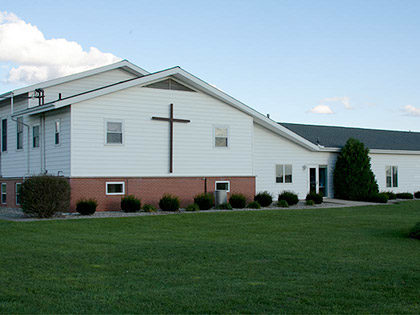Daniel 6:1-28
Introduction:
Structure of Daniel – 2-7; 3-6; 4-5
*Bricks that say “I am Nebuchadnezzar, ruler of Babylon”*
Text: Daniel 6
Verses 1-5
I will spare you the details because it’s a long discussion, but Darius is most likely another name for Cyrus the great. There are two theories as to who Darius was, either Cyrus the great or a general named Gobaru. There are good arguments for both but either way it doesn’t change the meaning of the text.
I go with Cyrus because the earliest translations and Jewish and Christian leaders believed it to be so.
Having two or more names was common in ancient history. Just in this book we have run into several people who have two different names, Daniel is one of them.
His other name could be Cyrus, it could be Gobaru, but we’re just going to go with Darius because that’s what the Bible calls him.
So, Darius, right off the bat, reveals himself to be a bit more reasonable of a ruler than the Babylonian kings ever were.
Darius didn’t utterly forget Daniel like Belshazzar did. And he didn’t need to have a catastrophic dream to realize Daniel’s potential or to recognize him properly. He saw that God was with Daniel and intended on his own volition to promote him to become the steward over the kingdom.
Daniel’s problems, this time, come not from a king filled with rage, but from jealous and scheming peers.
Verse five is an awesome testament to Daniel’s character and strong faith in God.
Link:
- Daniel had a reputation for being pure and righteous.
Daniel was so strongly devoted to God, that the schemers reckon that the only way to attack him is his devotion to God. They know that Daniel will do no wrong to the king and to God. They also know that if forced to make a choice between the king and God, Daniel will choose God. And so they devise an evil plan.
Verses 6-9
Well, I said that Darius was a bit more reasonable than Belshazzar and Nebuchadnezzar, and it’s true, but he’s not exactly great either. Nebuchadnezzar and Belshazzar were the ones devising the wicked plans. Darius isn’t devising the wicked plan here, but he is certainly complicit and ought to have realized that something fishy was going on. Especially eyebrow raising at the end is the comment “so that it cannot be changed, according to the law of the Medes and the Persians, which cannot be revoked.”
He should have said “OK, what are you up to?” But the idea of being put before God and man appealed to him, just like it did Nebuchadnezzar and Belshazzar, so he signed the document into law.
Well, these people said that all of the high officials of the kingdom agreed to this plan, but it goes without saying that Daniel was not included in that statement and would have given a hearty “no” if he had been asked about it, which he probably was not.
Link: This law is a death sentence for Daniel. He now must choose between obeying God or the king, and Daniel is the sort who will choose obeying God every time. The choice was very easy for Daniel.
Verses 10-13
No struggle. No hesitation. He receives news of the new law and proceeds to pray and give thanks to God just as he had always done. Notice especially that he gives thanks to God. No worries here. It’s also impressive that this was to last a mere 30 days.
I think so many of us would rationalize our way out of the problem.
“Oh, it’s just 30 days. I’ll just sit tight and it’ll all be over in a month. God won’t mind if I maybe just pray silently at night for the next month and forget about the day time prayers. It will only be a month and then I can go back to my normal commitment level to God.”
Link:
- Daniel had a reputation for being committed to God.
They knew where to find him and that he would be praying. That was the kind of reputation he had, that they could depend upon Daniel to continue to be faithful during this 30 day period, so they could spring the trap.
As planned, sometime soon after, Bible doesn’t say how soon after, Daniel’s opponents come and find Daniel disobeying the king’s edict. Just as they expected.
They immediately spring the trap.
Link: Darius reacts quite differently from Nebuchadnezzar and actually desires to save Daniel from this catastrophe, but unlike Nebuchadnezzar there are some limits to Darius’ authority. He cannot act above the law. His hands are tied.
Verses 14-18
- Daniel’s commitment to God earned him friends, enemies, respect, and enmity.
Daniel had developed a reputation before the king, and it was a good one. The king saw that Daniel served God continually. The truth of this statement is emphasized by the fact that Daniel was unwilling to stop even for 30 days. The king also actually spent time fasting and unable to sleep as a result of what his decree had done to Daniel.
But though Daniel’s faith touched the king in a positive way, it was used against him by his enemies.
Verses 19-24
- Daniel had a blameless reputation before God, and trusted in God, so God rescued him from the lion’s den.
The Bible attributes two reasons to Daniel’s miraculous rescue from the lions: 1) that he was blameless before God and the king, and 2) that he trusted in God.
Interestingly, it was because of Daniel’s 100% commitment to God that he got thrown into the lions’ den. And it was because of Daniel’s 100% commitment to God that he was rescued from the lions’ den. All the events here, good and bad, are coming about because of Daniel’s commitment to God.
And I think that’s an awesome thing. That’s the kind of story I’d like to have told of my life. The good stuff, the bad stuff, the whole package, happened because I chose to be committed to God. I’m certainly not there yet, but I’d like to be and am working towards it.
I hope we all are. A life well lived is a life lived for God.
Darius, on the other hand, again reveals that, though he might be better than Belshazzar and Nebuchadnezzar, he isn’t so great either. He throws not just the guilty into the den with the lions, but also their entire families. This was common practice in Persia. When one was found guilty and deserving of death, the family was killed along with them. This was probably to stop the family from retaliating in the future, and to set a strong example against further potential crimes. This way, the children wouldn’t grow up to try to avenge their parents. And others would be too frightened to try to manipulate the king for evil again, because if they got caught not only would they die, but so would their loved ones. And that’s a very strong deterrent.
Effective, but cruel.
Verses 25-28
- Daniel’s faith and integrity resulted in national recognition for the God of heaven and his own prosperity.
Daniel’s difficult trial was not in vain. Good came, bad came, but it was all to a purpose and God used it to reveal His glory and bless Daniel.
This too, is something I really admire about Daniel. Daniel was on the right side of history. HIStory. Everything that goes on in the world is tied in some way to God’s great story that He has been crafting. Eventually the story will reach its conclusion where all threads and pieces tie together, good triumphs, and evil loses. The people and things that do God’s will, will last and be rewarded. Those which do not will be punished.
Daniel lived his life in such a way that he had a big part to play in this story – larger than most people. It wasn’t easy. He faced death many times and had to live his life as a eunuch and be subjected to the constant instability of human government. Plots, schemes, agendas were constantly thrown his way which threatened to minimize or destroy him.
And his approach to those problems was so beautifully simply: He chose to obey God. That’s it. In the midst of so much adversity and complexity, he lived by an extremely simple principle: I will obey God.
Now, I don’t say easy. It was hard. I say simple, and indeed it was. And verse 10 is a great example of that difficult simplicity. *read*
Application:
Romans 8:28 – And we know that for those who love God all things work together for good, for those who are called according to his purpose
When you choose to commit to God as Daniel did, your life will be shaped by that decision. Your reputation will be shaped by that decision. Good things will happen to you as a result of that decision. And bad things will happen to you as a result of that decision. But it is all, good and bad, being woven together into God’s plan for human history and the end result will be good for you.

